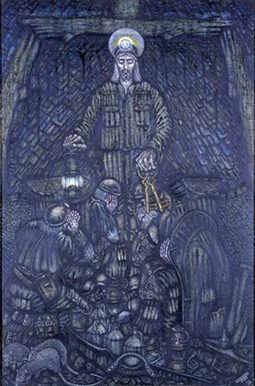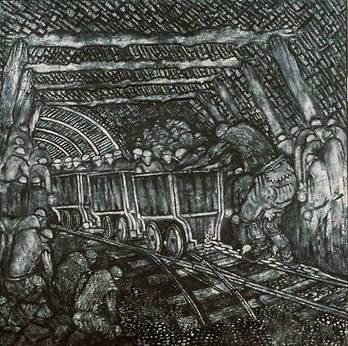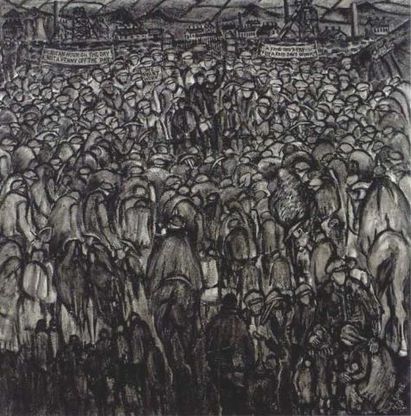kind of sanctuary. During the day my wife will tell me that I need more fresh air, and at dead of
night, when the compulsion to paint is as strong as ever, she complains that she has no company
in bed!" -- Nicholas Evans

Evans only worked in the mines for three years. His mother made him quit after his father died due to a mining accident. Bless her grieving heart! He found a job as a railwayman, becoming a train engine driver for the Great Western Railway. A man of strong Christian faith, he was also a lay Pentecostal Preacher.
When he was a boy, a teacher had encouraged him to draw, giving him a new pencil. He ended up not pursuing art. He could not afford to buy paper. Many years later, in his retirement, Evans took up painting. Self-taught, working with dark colors, using even his fingers and rags, he produced an astonishing number of paintings. His works intertwine two seemingly disparate themes: the hard life of workers in the mines and his Christian faith. Altho he only worked in the mines for three years, that time and his father's death, made a profound and lasting impact on him, which he expresses so movingly in his paintings.

The mine is a dark, hellish place of
backbreaking, dangerous labor.
Transport to the Far End.

Miners’ Strike – a fair day’s pay for a fair day’s work
No minimum wage. If you were injured
and couldn't work, you were out of a job.
No Workmen's Comp. The wealthy
owners didn't care.
They still don't. Just look at recent
events here in the U.S.
Specifically the West Virginia mine
disaster in April 2010. Take a cold,
hard look at the executives' response.
See Nicholas Evans' obituary in The Independent:
http://www.independent.co.uk/news/obituaries/nicholas-evans-549414.html
and in The Guardian:
http://www.guardian.co.uk/news/2004/mar/15/guardianobituaries.artsobituaries
And, insights from the blog, Babylon Wales:
http://babylonwales.blogspot.com/2006/09/nicholas-evans-welsh-van-gogh.html
 RSS Feed
RSS Feed